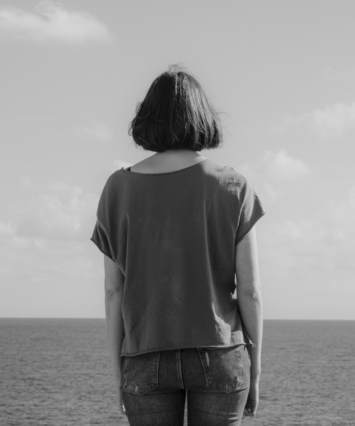Quietly and unobtrusively a framed, embroidered, poem hangs on the buttress by the fire door in the Church Hall. It’s hung there for more than 20 years. But why is it there, and who was its author?
Ursula Helm lived in Bramhope for the last third of her life, playing a quiet but important part in the life of the church community. Along with the PCC, Bible Study and Prayer Groups, Luncheon Club and flower arrangements, she regularly contributed her poetry and thoughts to St Giles’ Review under the pseudonym “Pathfinder”; one of them, “Reflections” was used at her funeral service; later, Maureen Hindes embroidered the poem and presented it to the church. But Ursula’s story was much more than her years in Bramhope.
She was born in 1905 in Shropshire, where her father was a doctor, before the family moved back to Manchester. Whilst her older sister became a nun with the Society of the Holy Child Jesus, Ursula chose to become a nurse for two reasons: “I had a strong sense there were people in the world who were ill and needed care”; and because the training was free, whereas it would have been costly for her to train as a secretary. (That mixture of sincere service & spirituality, and earthy common sense, was one of her hallmarks!) She wrote “I loved nursing from the moment I started it”. This was the first of four turning points in her life.
The second came in 1936 when, through the Oxford Group (an interdenominational and international movement which brought fresh spiritual life and vigour to hundreds of thousands), she “gave my life to God and have tried since then to find His plan for me as part of His greater plan; and to obey Him”. She was faithful to those spiritual and moral practises for the next 57 years. Shortly thereafter she felt led – against her own desire! – to apply for the post of Matron at the Manchester ENT hospital. She served there for 14 years (including throughout the war) during which “I learned a lot, changed a lot…and felt secure, needed and liked”.
She then felt led, against her own comfort, to resign, and to offer her nursing expertise, unpaid, to support those who were then working as full-time volunteers for Moral Re-Armament, “MRA”, (as the Oxford Group was then known), “for which experience I shall always be grateful; I have never regretted leaving my job”. The last such person she nursed (in London) was my maternal grandmother, Doris Vickers, who died of cancer in 1963. After her death, my grandfather, Farrar Vickers, decided to return to Leeds and chose to be near our family in Bramhope. He invited Ursula to become his housekeeper and home-maker; in practice, she became a much loved part of our family. She wrote: “The years [in Bramhope] were a great gift. I found it easy to be my real self, and the practical circumstances of running a home, making a garden, being part of the village were something I really enjoyed, as well as lasting friendships I have made.” After Farrar Vickers died in 1977, she moved to a cottage on Church Hill, before spending her last years in Rosemont – always making friends, always reaching out, always believing – and drawing out – the best in other people.
Her keen sense of the ridiculous is reflected in this limerick, which she wrote (as a former Matron!) whilst in Otley Hospital in 1992:
“One question remains which I would / Gladly answer if only I could / It is how to survive / From the time you arrive / All the things that are doing you good” !!
Ursula died in January 1993. At her funeral, Raymond Ward, then Vicar of Bramhope, said “…her whole life was a witness to her strong Christian faith. She sought God’s guidance in everything she did, praying deeply before making any decisions and following whatever He willed for her, knowing that His will brought love and goodness. So she was remarkably positive about everything, …[seeing] the goodness in people and God’s victory over human apathy and evil…. Whatever she possessed, right to the very end, she was happy to share with or give to others: generous to the extreme.” He concluded by reading the poem that hangs in the church hall:
“Your life is meant for living / So don’t grumble it away. / Take every chance of giving / Rejoice in every day.
No wasting thoughts about the folk / Who should be nice – but aren’t / Or all the things you’d like to do / Or be, or have, but can’t.
You may be given many years / Or only just a few / Decide today to give your best / And BE the best that’s you.”
English


